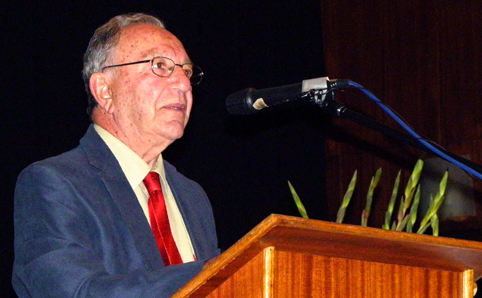Latest News Archive
Please select Category, Year, and then Month to display items
12 January 2024
|
Story Nonsindiswe Qwabe
|
Photo Sonia Small
 Since joining the UFS in 2008, Dr Grey Magaiza has worked extensively on approaches that can foster the socio-economic transformation of societies.
Since joining the UFS in 2008, Dr Grey Magaiza has worked extensively on approaches that can foster the socio-economic transformation of societies.
“The future should be one where communities can decide on their development agenda and futures. That’s the most important for me.” Dr Grey Magaiza, Deputy Director of the Centre for Gender and Africa Studies (CGAS) and Head of the Community Development programme on the Qwaqwa Campus, is passionate about capacitating communities to be agents of change and advancement. His vision for the future emphasises the empowerment of communities to take charge of their development by actively participating in decision making and the implementation of development projects that can improve their lives.
Since joining the UFS in 2008, Dr Magaiza has worked extensively on approaches that can foster the socio-economic transformation of societies. Over the years, he has crafted his research speciality into one that he is most proud of – being an interdisciplinary scientist immersed in the development of communities.
“I’m in a fortunate position of researching what I like. I say ‘fortunate’, because I’ve taken the time to understand what I’m passionate about, which is the overall field of rural livelihoods and livelihood futures – in short, community development. My research starts from an engaged university, understanding the elements that a university must use to enhance transformation and relevance to its immediate community in terms of development.”
One of the ways he has done this is by looking at social entrepreneurship as a development approach for young people in a rural setting. Through workshops with non-profit and civic organisations in Qwaqwa, Dr Magaiza has been helping these organisations to map out their needs and actively meet them through the involvement and support of external role players.
“We understand that communities are part of the national development agenda, but even that national agenda respects community knowledge and intentions and allows communities to shape their identity. A critical enabler of this is community organising. You bring back the capacity in communities to have dialogues on issues affecting them as spaces for engagement, knowledge exchange, and for people to just talk about their way forward.”
By enabling communities to define their development agenda, they can address their specific needs, challenges, and aspirations, he said. “When I look at livelihood futures, it’s quite an exciting aspect of my work – it’s like looking into a fortune tellers’ globe, because you’re not deciding for communities what they should do, but the communities themselves take those decisions.”
UFS hosts final ANC Centenary Seminar for 2011
2011-11-28
 |
|
Prof. Benjamin Turok speaking about the Evolution of Economic Policy Thinking.
Photo: Henco Myburgh
|
The African National Congress (ANC) government is faced with the dilemma of an inherited distorted economy. Subsequently South Africa has the most unequal society in the world. That is according to Prof. Benjamin Turok, head of Political Education for the ANC in Parliament. Prof. Turok spoke at an ANC Centenary Dialogue at the Bloemfontein Campus of the University of the Free State (UFS) on 23 November 2011.
Delivering the last lecture of the year in a series of dialogues about the ANC, Prof. Turok said it was hard to swallow that after 100 years there is still inequality. This for a party whose essence is the notion of sharing, as set out in the Freedom Charter. Prof. Turok told the audience in a packed Odeion Theatre that the ANC Centenary provided a moment of reflection. “If we neglect the poor and uneducated and do not interfere and direct investment, we will always have inequality.”
Talking about youth unemployment, Prof. Turok said that no society can live in peace if young people are not employed. He said that he welcomed the energy the ANC Youth League has put in economic policy, but would like to see a youth league economic policy that is scientific.
The ANC Centenary Dialogue series has been hosted by the Centre for Africa Studies and will continue on 15 February 2012.